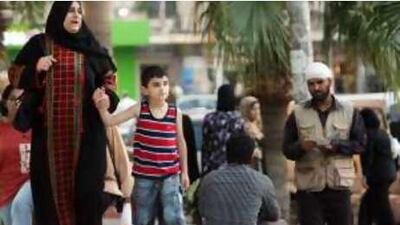AMMAN // A young boy sits crying at the edge of a road near a traffic light, the yellow and red packets of chewing gum he had hoped to sell scattered at his feet. Some sympathetic passers-by drop him a few coins.
"I felt so sorry for him and handed him some money," said Zahia Daoud, 41, "but as I was driving a few days later, I saw the same scene but at a different traffic light. "That's when I knew it was a lie." It is a situation familiar to many Jordanians, but one the government is trying to stamp out. A study conducted by the ministry of social development last year revealed that 95 per cent of beggars were not as needy as they claimed to be. In fact, about 40 per cent received benefits from the National Aid Fund, while others had a pension or another source of income, it said.
"Most of the beggars caught are not needy, but they find begging profitable. The only way to fight this practice is for people to stop giving them money," said Khaled Rawashdeh, the director of the ministry's anti-vagrancy programme. With Ramadan approaching, the government has stepped up a campaign against beggars and street hawkers who seek to exploit the philanthropic spirit of the holy month. Under the theme, "Begging is your responsibility", the ministry and the city of Amman are trying to raise awareness to encourage Jordanians to stop giving money to beggars. In brochures, newspaper and television ads and on radio, it will try to highlight the negative aspects of giving money to beggars and street hawkers.
The campaign will run through the end of the summer. Mr Rawashdeh said those caught begging will be rounded up and placed in special detention centres until a guarantor can pay their bail. First offenders face a three-month jail sentence. Those caught a second time could go to jail for up to three years. Ministry officials are also concerned that many of the children seen begging in Jordan are being exploited by professional criminals.
"We have recently caught six boys between the ages of 12 and 14 who were selling chewing gum ? crying for sympathy," said Mr Rawashdeh. "It turned out that there is a ring in the Hussien [Palestinian refugee] camp that exploits children. So when one child is caught, they send another to replace him at a different traffic light." Such cases represent about 20 per cent of beggars caught, he said. The awareness campaign will also include a study to gauge the living conditions of beggars and if they qualify for assistance from the National Aid Fund.
The fund is already helping more than 77,000 families in a country, where 14.7 per cent of the kingdom's 5.8 million population live below the poverty line. The fund has an annual budget of US$90 million (Dh330m) and is expected to spend about $1m on helping 83,000 people this year. While the government is trying to help those who are genuinely in need, it has also increased the penalties for begging, raising the amount of time in detention to two months and increasing bail for repeat offenders to more than $1,400.
The higher bail seems to have deterred some from heading back to the streets, Mr Rawashdeh said. In Zarqa, about 25km north-east of Amman, Adnadn Khazaleh, the director of the ministry of social development, said his department had come up with a new initiative to fight begging during Ramadan. A task force from the ministry and the Public Security Department will arrest beggars and take them to a detention centre where they will spend at least two weeks or possibly the entire month of Ramadan.
"We also try to reach [the public] through mosques to discourage people from giving them money," said Mr Khazaleh. But that may not be an easy job, particularly during Ramadan. Last year, during the holy month, the ministry team in Zarqa tried to chase four beggars who entered a mosque following Friday prayers. The chase almost ended in a fight as those praying tried to stop the ministry team from apprehending the beggars. In the end, the ministry force allowed the beggars to go free.
@Email:smaayeh@thenational.ae

